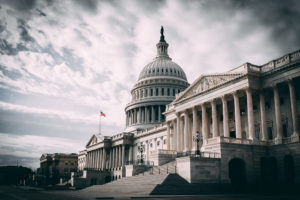Taking Action: A 2021 Legislative Wrap-Up
 Photo by Harold Mendoza on Unsplash
Photo by Harold Mendoza on Unsplash Congress is making its last concentrated effort to fund the government, raise the debt ceiling, deliver the Defense Authorization Act, and pass voting rights and the Build Back Better Act before they break for holidays. A look back at legislative efforts the American Humanist Association (AHA) has supported this year illustrates how much Congress has–or hasn’t–accomplished, despite our country’s need for this legislation.
Do No Harm Act
The Do No Harm Act has been introduced in the House and the Senate but hasn’t seen any tangible movement in months. This legislation is pivotal to addressing the growing tide of organizations, companies, and agencies using religious exemptions through the Religious Freedom Restoration Act (RFRA) to justify discrimination. The Act states that RFRA cannot be used to violate federal nondiscrimination laws, employment laws, and child labor and protection laws. It prevents the use of RFRA to erode access to health care or government services. Unfortunately, it looks like this year will close without additional movement for the Do No Harm Act. The AHA continues to encourage legislators to hold a hearing to build momentum for passing the Act next year.
Equality Act
The Equality Act passed the House in February and was thus introduced into the Senate, stirring hope that it might be passed this year. Eventually–like the Do No Harm Act–it stalled and it has become apparent that Congress will not pass it before the year is up. If the Equality Act were passed, it would amend several civil rights laws, including the Civil Rights Act of 1964, to explicitly include sexual orientation and gender identity as protected categories, just like race. It would implement equal protections for LGBTQ+ people within healthcare, employment, education, housing, and federally funded programs. This legislation would provide necessary protections for communities that lack options when seeking redress for discrimination.
NO BAN Act
The NO BAN Act has passed in the House but, like many other bills on this list, it stalled in the Senate. Trump’s ban on travel and immigration from Muslim-majority countries was nothing short of an abuse of presidential power and was immediately rescinded when President Biden took office. The NO BAN Act would take Biden’s actions a step further to ensure that future presidents can’t take similar discriminatory measures by amending the Immigration and Nationality Act so that Congress has stronger oversight abilities when a president enacts a broad classification travel ban. Under Trump’s ban, many people were unable to seek asylum from their countries, unable to access life-saving medical care, barred from joining their families to mourn the loss of a loved one, or even prevented from embracing their loved ones.
Voting Rights
The John Lewis Voting Rights Advancement Act (VRAA) passed the House in September and, this November, a substantial effort was made to get it through the Senate but the vote failed. If passed, the VRAA would require that discriminatory changes to voting laws be reviewed federally (under a new formula) before they could be implemented, protecting marginalized groups from voter disenfranchisement. For states with a recent history of discriminatory voting restrictions, any changes to voting laws would need federal approval.
The For the People Act addresses voter disenfranchisement in the areas that the VRAA doesn’t cover by expanding voting access, election security, campaign finance rules, ethics rules for all three branches of government, and gerrymandering rules. For the People has passed the House but met the same fate as the VRAA in the Senate and has stalled. At least nineteen states have recently instituted voter suppression tactics that disproportionately target communities of color, people living in poverty, and the disabled community. The Freedom to Vote Act is a pared-down version of these two bills. This particular bill is slated to be on Congress’s list of priorities after Build Back Better is done.
National Day of Reason Resolution
The National Day of Reason is a celebration of critical thought, scientific integrity, and free inquiry. To tackle the complex and evolving challenges humans face in the 21st century, it is essential that modern solutions champion reason and scientific research. Representative Jamie Raskin (D-MD) introduced a resolution in the House to designate May 7, 2021, as a National Day of Reason. AHA leads the civil society effort in support of Rep. Raskin’s resolution and helped double the number of co-sponsors from last year. This resolution makes clear the practical implications of straying from evidence-based policy. Belief in reason and science, which includes nationwide confidence in the “safety and efficacy of vaccines and evidence-based solutions to the inequities exacerbated by the pandemic,” can be the difference between struggling to save the lives of thousands and successfully saving the lives of millions.
Build Back Better Act
The Build Back Better Act includes substantial monetary support for American families, through investments in early-childhood education, nutrition assistance, paid family and medical leave, and tax relief. The access-to-work authorization, benefits, and deportation protections for an estimated 7.1 million undocumented people living in the United States would especially support immigrant children and parents who wish to stay together. The transformative half-trillion dollars invested in clean energy solutions would get us closer to a sustainable future for all that protects the health of our families and our planet for future generations. Our country needs support for these pivotal programs now more than ever. This legislation has passed the House and now the Senate is in negotiations to propose their version.
If you want to take action and tell your representatives to support the passage of these bills, visit our action center today.
